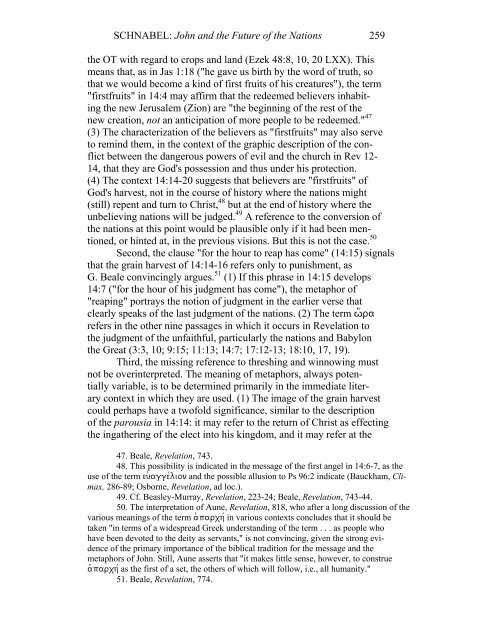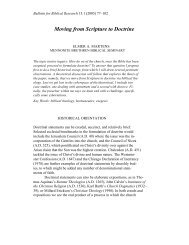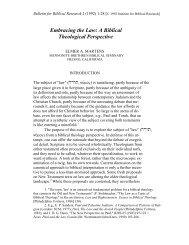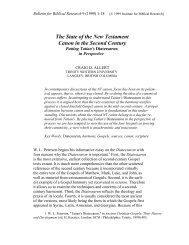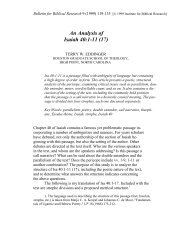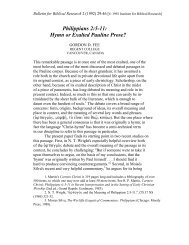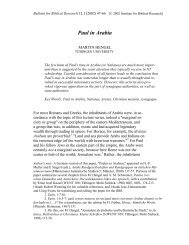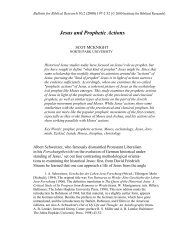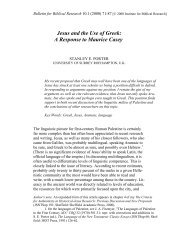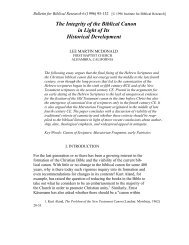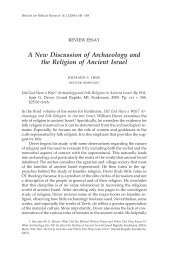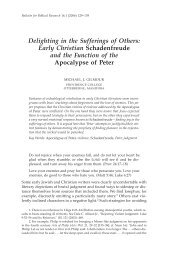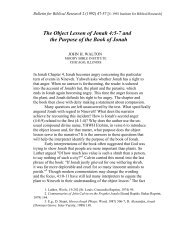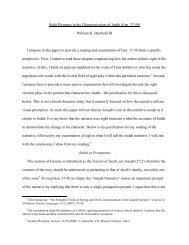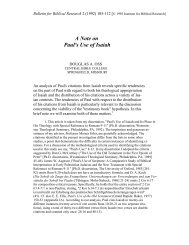John and the Future of the Nations - Institute for Biblical Research
John and the Future of the Nations - Institute for Biblical Research
John and the Future of the Nations - Institute for Biblical Research
You also want an ePaper? Increase the reach of your titles
YUMPU automatically turns print PDFs into web optimized ePapers that Google loves.
SCHNABEL: <strong>John</strong> <strong>and</strong> <strong>the</strong> <strong>Future</strong> <strong>of</strong> <strong>the</strong> <strong>Nations</strong> 259<br />
<strong>the</strong> OT with regard to crops <strong>and</strong> l<strong>and</strong> (Ezek 48:8, 10, 20 LXX). This<br />
means that, as in Jas 1:18 ("he gave us birth by <strong>the</strong> word <strong>of</strong> truth, so<br />
that we would become a kind <strong>of</strong> first fruits <strong>of</strong> his creatures"), <strong>the</strong> term<br />
"firstfruits" in 14:4 may affirm that <strong>the</strong> redeemed believers inhabiting<br />
<strong>the</strong> new Jerusalem (Zion) are "<strong>the</strong> beginning <strong>of</strong> <strong>the</strong> rest <strong>of</strong> <strong>the</strong><br />
new creation, not an anticipation <strong>of</strong> more people to be redeemed." 47<br />
(3) The characterization <strong>of</strong> <strong>the</strong> believers as "firstfruits" may also serve<br />
to remind <strong>the</strong>m, in <strong>the</strong> context <strong>of</strong> <strong>the</strong> graphic description <strong>of</strong> <strong>the</strong> conflict<br />
between <strong>the</strong> dangerous powers <strong>of</strong> evil <strong>and</strong> <strong>the</strong> church in Rev 12-<br />
14, that <strong>the</strong>y are God's possession <strong>and</strong> thus under his protection.<br />
(4) The context 14:14-20 suggests that believers are "firstfruits" <strong>of</strong><br />
God's harvest, not in <strong>the</strong> course <strong>of</strong> history where <strong>the</strong> nations might<br />
(still) repent <strong>and</strong> turn to Christ, 48 but at <strong>the</strong> end <strong>of</strong> history where <strong>the</strong><br />
unbelieving nations will be judged. 49 A reference to <strong>the</strong> conversion <strong>of</strong><br />
<strong>the</strong> nations at this point would be plausible only if it had been mentioned,<br />
or hinted at, in <strong>the</strong> previous visions. But this is not <strong>the</strong> case. 50<br />
Second, <strong>the</strong> clause "<strong>for</strong> <strong>the</strong> hour to reap has come" (14:15) signals<br />
that <strong>the</strong> grain harvest <strong>of</strong> 14:14-16 refers only to punishment, as<br />
G. Beale convincingly argues. 51 (1) If this phrase in 14:15 develops<br />
14:7 ("<strong>for</strong> <strong>the</strong> hour <strong>of</strong> his judgment has come"), <strong>the</strong> metaphor <strong>of</strong><br />
"reaping" portrays <strong>the</strong> notion <strong>of</strong> judgment in <strong>the</strong> earlier verse that<br />
clearly speaks <strong>of</strong> <strong>the</strong> last judgment <strong>of</strong> <strong>the</strong> nations. (2) The term w#ra<br />
refers in <strong>the</strong> o<strong>the</strong>r nine passages in which it occurs in Revelation to<br />
<strong>the</strong> judgment <strong>of</strong> <strong>the</strong> unfaithful, particularly <strong>the</strong> nations <strong>and</strong> Babylon<br />
<strong>the</strong> Great (3:3, 10; 9:15; 11:13; 14:7; 17:12-13; 18:10, 17, 19).<br />
Third, <strong>the</strong> missing reference to threshing <strong>and</strong> winnowing must<br />
not be overinterpreted. The meaning <strong>of</strong> metaphors, always potentially<br />
variable, is to be determined primarily in <strong>the</strong> immediate literary<br />
context in which <strong>the</strong>y are used. (1) The image <strong>of</strong> <strong>the</strong> grain harvest<br />
could perhaps have a tw<strong>of</strong>old significance, similar to <strong>the</strong> description<br />
<strong>of</strong> <strong>the</strong> parousia in 14:14: it may refer to <strong>the</strong> return <strong>of</strong> Christ as effecting<br />
<strong>the</strong> inga<strong>the</strong>ring <strong>of</strong> <strong>the</strong> elect into his kingdom, <strong>and</strong> it may refer at <strong>the</strong><br />
47. Beale, Revelation, 743.<br />
48. This possibility is indicated in <strong>the</strong> message <strong>of</strong> <strong>the</strong> first angel in 14:6-7, as <strong>the</strong><br />
use <strong>of</strong> <strong>the</strong> term eu)agge/lion <strong>and</strong> <strong>the</strong> possible allusion to Ps 96:2 indicate (Bauckham, Climax,<br />
286-89; Osborne, Revelation, ad loc.).<br />
49. Cf. Beasley-Murray, Revelation, 223-24; Beale, Revelation, 743-44.<br />
50. The interpretation <strong>of</strong> Aune, Revelation, 818, who after a long discussion <strong>of</strong> <strong>the</strong><br />
various meanings <strong>of</strong> <strong>the</strong> term a)parxh/ in various contexts concludes that it should be<br />
taken "in terms <strong>of</strong> a widespread Greek underst<strong>and</strong>ing <strong>of</strong> <strong>the</strong> term . . . as people who<br />
have been devoted to <strong>the</strong> deity as servants," is not convincing, given <strong>the</strong> strong evidence<br />
<strong>of</strong> <strong>the</strong> primary importance <strong>of</strong> <strong>the</strong> biblical tradition <strong>for</strong> <strong>the</strong> message <strong>and</strong> <strong>the</strong><br />
metaphors <strong>of</strong> <strong>John</strong>. Still, Aune asserts that "it makes little sense, however, to construe<br />
a)parxh/ as <strong>the</strong> first <strong>of</strong> a set, <strong>the</strong> o<strong>the</strong>rs <strong>of</strong> which will follow, i.e., all humanity."<br />
51. Beale, Revelation, 774.


